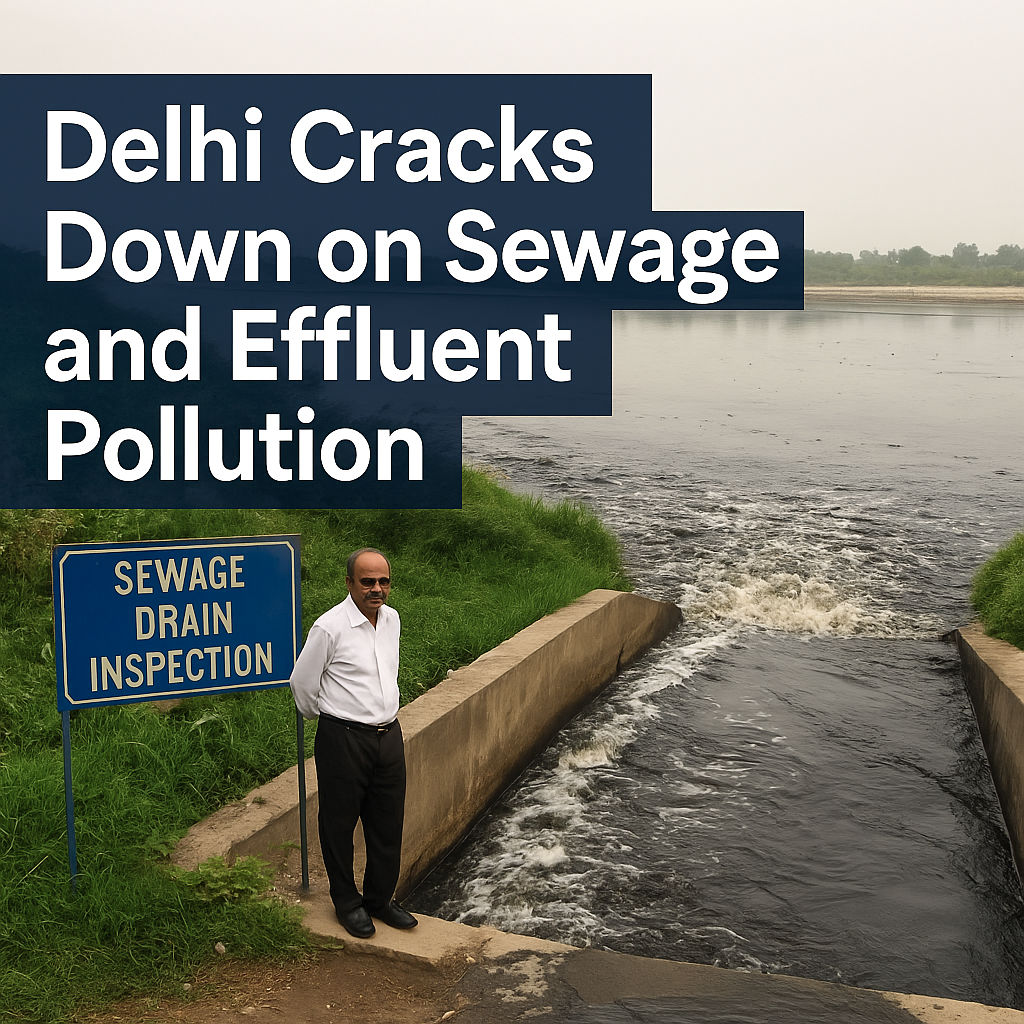Tighter Oversight on Water Pollution Sources in the Capital
In a decisive move to curb pollution in Delhi’s water bodies, the Delhi government has directed all concerned agencies to enforce stricter compliance with sewage and effluent treatment norms. This includes stringent monitoring of Sewage Treatment Plants (STPs) and Effluent Treatment Plants (ETPs), especially those operated by government departments, industrial units, and large residential complexes.
The decision was taken following a high-level review by Delhi Environment Minister Gopal Rai, who stressed that ensuring wastewater is treated as per prescribed standards is critical to improving the capital’s ecological health.
Why This Directive Matters
Delhi’s Yamuna river remains severely polluted, largely due to untreated or poorly treated sewage. Despite multiple clean-up campaigns, major polluters include:
- Government and private institutions not complying with STP mandates
- Industrial clusters discharging untreated effluent
- Unauthorized colonies lacking proper sewage disposal systems
This renewed push marks a serious effort to address the systemic gaps in water waste management that continue to undermine Delhi’s environmental sustainability.
What Has Been Ordered
As per the latest directive:
- The Delhi Pollution Control Committee (DPCC) will conduct surprise inspections across STPs and ETPs.
- Action will be initiated against defaulting government bodies and private institutions alike.
- Agencies must submit status reports on compliance levels within fixed timeframes.
- Residential societies, especially those with populations above a certain threshold, will be monitored for adherence to STP installation and operational guidelines.
Officials Speak Out
In a press briefing, Environment Minister Gopal Rai emphasized:
“Our focus is on strict enforcement, not just advisories. Agencies and institutions that violate environmental norms will face legal and financial penalties.”
Senior officials also indicated that this enforcement push is part of a broader campaign to prepare Delhi for the upcoming monsoon season, where water contamination risks rise significantly.
Targeted Sectors and Impact
The crackdown will directly affect:
- Industrial estates such as Wazirpur, Bawana, and Okhla
- Residential projects without operational STPs
- Government buildings that are yet to install mandated waste treatment facilities
Experts suggest that if rigorously implemented, this policy could dramatically reduce non-point source pollution in urban drains and the Yamuna.
Monitoring and Penalties
The Delhi government has empowered DPCC with:
- Greater autonomy to conduct real-time water quality checks
- Authority to impose fines and recommend legal action
- Mandate to shut down polluting units until compliance is achieved
Sources confirm that repeat violators may also face prosecution under the Environment Protection Act.
Driving Accountability Ahead of the Monsoon
With the monsoon season approaching, this move is timely. During the rainy season, untreated sewage frequently overflows into open drains, making waterborne diseases more rampant.
Delhi’s approach now aligns with national goals under the Namami Gange and Jal Shakti Abhiyan programs, which mandate robust local action for water resource protection.
Public Awareness and Citizen Role
Citizens are also being urged to:
- Report illegal discharge of waste or untreated sewage
- Ensure housing societies comply with STP rules
- Participate in local water conservation initiatives
Campaigns for public awareness, particularly in water-logged zones like East Delhi, Najafgarh, and parts of North Delhi, are also planned.
Delhi’s Environmental Future Hinges on Execution
This policy shift is promising, but success will depend on implementation discipline, inter-agency coordination, and real penalties. With the capital under increasing environmental strain, this directive—if backed by action—could be a meaningful step toward restoring Delhi’s water systems.
FAQs
What is the Delhi government doing to control water pollution?
The Delhi government has directed strict enforcement of sewage and effluent treatment norms, targeting industries, unauthorized settlements, and construction sites contributing to Yamuna pollution.
What are STPs and ETPs, and why are they important?
STPs (Sewage Treatment Plants) and ETPs (Effluent Treatment Plants) treat wastewater before it’s discharged. They are crucial for reducing pollutants entering rivers like the Yamuna.
Which areas in Delhi are being monitored for untreated wastewater discharge?
Key zones under strict surveillance include North Delhi, Najafgarh, Wazirpur, Okhla, East Delhi, and Bawana, where illegal or underperforming plants have been identified.
Who is responsible for implementing these pollution controls in Delhi?
The Delhi Pollution Control Committee (DPCC), Public Works Department (PWD), Delhi Jal Board (DJB), and local municipal bodies are jointly tasked with monitoring and enforcement.
What action will be taken against violations of sewage norms?
The government has warned of fines and legal action against any entity—residential, industrial, or municipal—that fails to meet discharge norms or operate treatment facilities properly.

